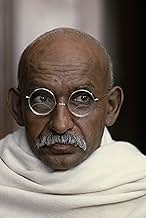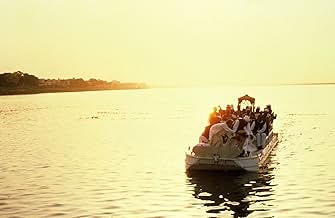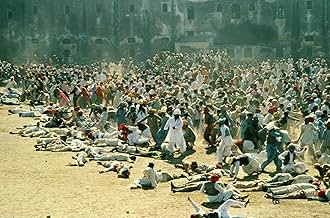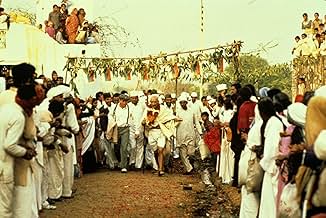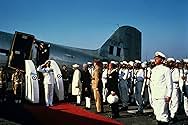La vida del abogado que se convirtió en el famoso líder de las revueltas hindúes contra el dominio británico a través de su filosofía de protesta no violenta.La vida del abogado que se convirtió en el famoso líder de las revueltas hindúes contra el dominio británico a través de su filosofía de protesta no violenta.La vida del abogado que se convirtió en el famoso líder de las revueltas hindúes contra el dominio británico a través de su filosofía de protesta no violenta.
- Ganó 8 premios Óscar
- 35 premios y 23 nominaciones en total
Rohini Hattangadi
- Kasturba Gandhi
- (as Rohini Hattangady)
Günther Maria Halmer
- Herman Kallenbach
- (as Gunter Maria Halmer)
Best Picture Winners by Year
Best Picture Winners by Year
See the complete list of Best Picture winners. For fun, use the "sort order" function to rank by IMDb rating and other criteria.
Argumento
¿Sabías que...?
- CuriosidadesOver 300,000 extras appeared in the funeral sequence. About 200,000 were volunteers, and 94,560 were paid a small fee (under contract). The sequence was filmed on January 31, 1981, the 33rd anniversary of Mohandas Karamchand Gandhi's funeral. Eleven crews shot over 20,000 feet of film, which was pared down to two minutes and five seconds in the final release.
- PifiasIn the opening scene in South Africa, Gandhi is riding first class on a steam locomotive. The first class car is shown as the forward car, closest to the engine. In passenger steam engines, first class would be the rearmost car, farthest away from the engine's heat and exhaust. Second or third class would be nearest the engine.
- Créditos adicionalesOpening credits prologue: No man's life can be encompassed in one telling. There is no way to give each year its allotted weight, to include each event, each person who helped to shape a lifetime. What can be done is to be faithful in spirit to the record and try to find one's way to the heart of the man....
NEW DELHI INDIA 30th JANUARY 1948
- Versiones alternativasIn April 2005, Skoll launched the Gandhi Project in partnership with Silicon Valley entrepreneur Kamran Elahian. Working with Palestinian voice actors and artists, an award-winning director dubbed the epic film into Arabic. It is being screened throughout Palestine in order to advance civil society goals of peaceful resistance, self-reliance, economic development and local empowerment, and plans are underway to expand screenings throughout the Arab world.
- ConexionesFeatured in The Making of Gandhi: Mr. Attenborough and Mr. Gandhi (1983)
- Banda sonoraGod Save the King!
(1744) (uncredited)
Music attributed to Henry Carey
Sung by Ben Kingsley
Reprised when India achieves independence
Reseña destacada
In her diary entry of Saturday, February 27, 1943, Anne Frank wrote in passing (translated from the Dutch): "The freedom-loving Gandhi of India is holding his umpteenth fast."
It's a comment at once mildly comical and respectfully admiring, one I think the Mahatma would have appreciated with a twinkle and a laugh. He and Miss Frank are linked with the Reverend Martin Luther King, Jr., as the civil rights spokesperson-giants of the 20th century. And civil rights, and the reversal of the institutionalized violation of the same, are a large part of what the last century's politics were all about. Movie viewers are apt to find in the diary remark a distillation of their experience of the Richard Attenborough film. A recommendation is that it be followed by rentals of Saving Private Ryan and The Long Walk Home, which together convey the investment put into the respective causes the trio represented.
At the beginning of Gandhi we confront these words: "No man's life can be encompassed in one telling. There is no way to give each year its allotted weight, to include each event, each person who helped to shape a lifetime. What can be done is to be faithful in spirit to the record, and to try to find one's way to the heart of the man...."
John Briley's screenplay accomplishes that faithfulness, and one probably has to be a scholar of the subject to sort out what is his and what is Gandhi's. Not that it really is of relevance, given what we learn from the movie about the value of eclecticism. Looking out over the bay at Porbandar, Gandhi (Ben Kingsley) tells Walker (Martin Sheen): "The temple where you were yesterday is of my family's sect, the Pranami. It was Hindu of course, but the priests used to read from the Muslim Koran and the Hindu Gita, moving from one to the other as though it mattered not at all which book was read as long as God was worshipped." In a preceding scene, similarly, confronted by young toughs on a South African street, Gandhi defends for his Christian friend Charlie (Ian Charleson) the New Testament intelligence of turning the other cheek. A worried Charlie states, "I think perhaps the phrase was used metaphorically. I don't think our Lord meant...," and is interrupted by a movie shot of the approaching menace. Gandhi replies calmly, "I'm not so certain. I have thought about it a great deal. I suspect he meant you must show courage--be willing to take a blow--several blows--to show you will not strike back--nor will you be turned aside.... And when you do that it calls upon something...that makes...hate for you diminish and...respect increase. I think Christ grasped that and I...have seen it work."
The script is replete with these kinds of memorable words, and with others that reflect its subject's political acumen and strategical cleverness.
Kingsley is sublime in the lead role. Saeed Jaffrey, Roshan Seth, and Alyque Padamsee do well as Gandhi's pro-independence collaborators. Ditto, Athol Fugard ("Assuming we are in agreement?") and John Gielgud ("Salt?") as two of his adversaries. Charleson, in his clerical collar, looks like he has walked in off the set of the preceding year's Academy Award winner, Chariots of Fire (where he played the Scottish sprinter-missionary, Eric Liddell).
This movie won eight Oscars, with Attenborough, Briley, and Kingsley all earning honors. No other film biography I ever have seen works so well. It will stand the test of time and inform multiple generations. One doubts remakes will be necessary.
It's a comment at once mildly comical and respectfully admiring, one I think the Mahatma would have appreciated with a twinkle and a laugh. He and Miss Frank are linked with the Reverend Martin Luther King, Jr., as the civil rights spokesperson-giants of the 20th century. And civil rights, and the reversal of the institutionalized violation of the same, are a large part of what the last century's politics were all about. Movie viewers are apt to find in the diary remark a distillation of their experience of the Richard Attenborough film. A recommendation is that it be followed by rentals of Saving Private Ryan and The Long Walk Home, which together convey the investment put into the respective causes the trio represented.
At the beginning of Gandhi we confront these words: "No man's life can be encompassed in one telling. There is no way to give each year its allotted weight, to include each event, each person who helped to shape a lifetime. What can be done is to be faithful in spirit to the record, and to try to find one's way to the heart of the man...."
John Briley's screenplay accomplishes that faithfulness, and one probably has to be a scholar of the subject to sort out what is his and what is Gandhi's. Not that it really is of relevance, given what we learn from the movie about the value of eclecticism. Looking out over the bay at Porbandar, Gandhi (Ben Kingsley) tells Walker (Martin Sheen): "The temple where you were yesterday is of my family's sect, the Pranami. It was Hindu of course, but the priests used to read from the Muslim Koran and the Hindu Gita, moving from one to the other as though it mattered not at all which book was read as long as God was worshipped." In a preceding scene, similarly, confronted by young toughs on a South African street, Gandhi defends for his Christian friend Charlie (Ian Charleson) the New Testament intelligence of turning the other cheek. A worried Charlie states, "I think perhaps the phrase was used metaphorically. I don't think our Lord meant...," and is interrupted by a movie shot of the approaching menace. Gandhi replies calmly, "I'm not so certain. I have thought about it a great deal. I suspect he meant you must show courage--be willing to take a blow--several blows--to show you will not strike back--nor will you be turned aside.... And when you do that it calls upon something...that makes...hate for you diminish and...respect increase. I think Christ grasped that and I...have seen it work."
The script is replete with these kinds of memorable words, and with others that reflect its subject's political acumen and strategical cleverness.
Kingsley is sublime in the lead role. Saeed Jaffrey, Roshan Seth, and Alyque Padamsee do well as Gandhi's pro-independence collaborators. Ditto, Athol Fugard ("Assuming we are in agreement?") and John Gielgud ("Salt?") as two of his adversaries. Charleson, in his clerical collar, looks like he has walked in off the set of the preceding year's Academy Award winner, Chariots of Fire (where he played the Scottish sprinter-missionary, Eric Liddell).
This movie won eight Oscars, with Attenborough, Briley, and Kingsley all earning honors. No other film biography I ever have seen works so well. It will stand the test of time and inform multiple generations. One doubts remakes will be necessary.
- Chris_Middlebrow
- 17 sept 2001
- Enlace permanente
Selecciones populares
Inicia sesión para calificar y añadir a tu lista para recibir recomendaciones personalizadas
Detalles
- Fecha de lanzamiento
- Países de origen
- Idiomas
- Títulos en diferentes países
- Richard Attenborough's Film: Gandhi
- Localizaciones del rodaje
- Old Town Hall, Staines, Surrey, Inglaterra, Reino Unido(courtroom in India)
- Empresas productoras
- Ver más compañías en los créditos en IMDbPro
Taquilla
- Presupuesto
- 22.000.000 US$ (estimación)
- Recaudación en Estados Unidos y Canadá
- 52.767.889 US$
- Fin de semana de estreno en EE. UU. y Canadá
- 131.153 US$
- 12 dic 1982
- Recaudación en todo el mundo
- 52.768.419 US$
- Duración3 horas 11 minutos
- Color
- Mezcla de sonido
- Relación de aspecto
- 2.35 : 1
Contribuir a esta página
Sugerir un cambio o añadir el contenido que falta






